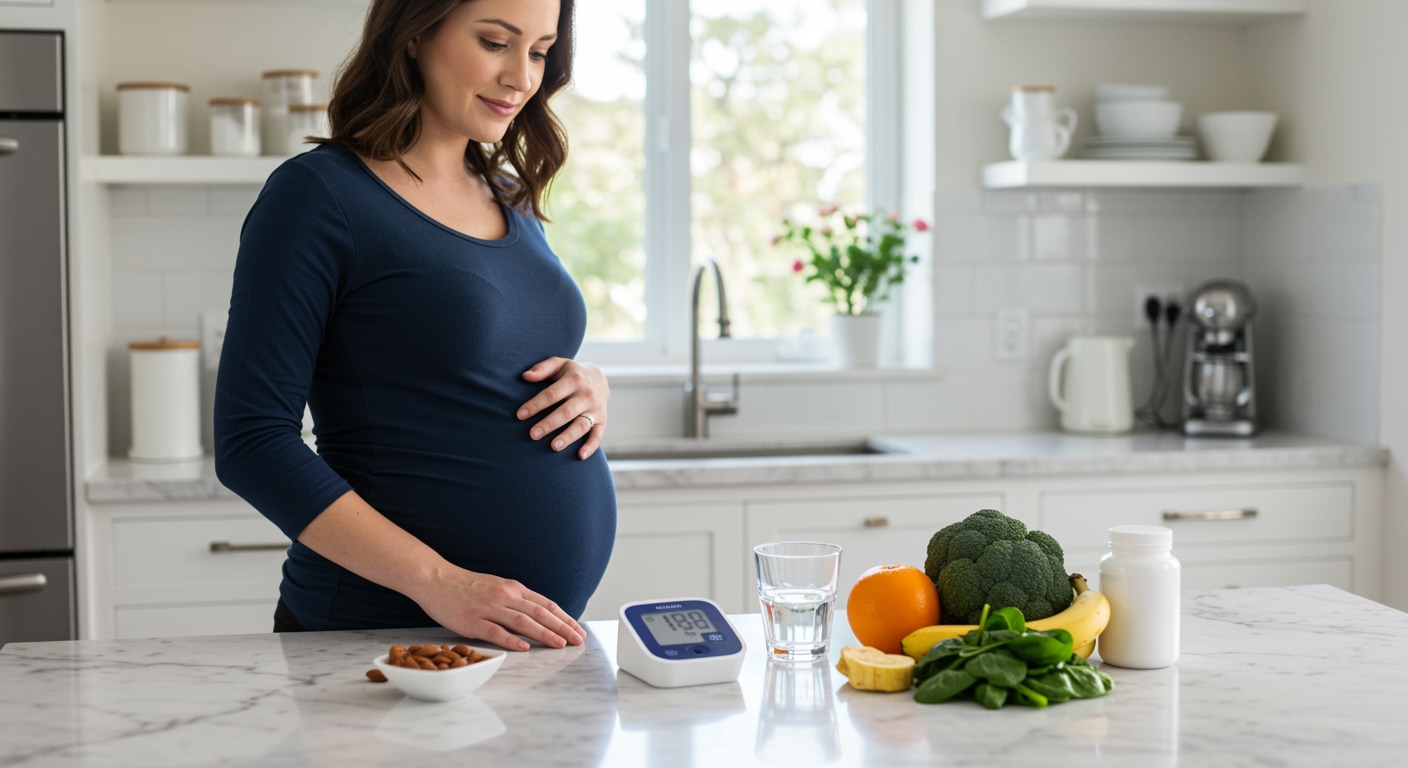✪ Key Takeaway: Pregnancy commonly causes temporary low blood pressure due to hormonal changes and increased blood volume demands.
Introduction
You feel dizzy when you stand up from your favorite chair.
Your doctor mentions your blood pressure readings are lower than usual, and you wonder if your pregnancy is causing these changes.
Hi, I’m Abdur, your nutrition coach, and today I’m going to explain how pregnancy affects your blood pressure and what you need to know about temporary low blood pressure during this important time.
Why Does Pregnancy Lower Blood Pressure?
Your body undergoes massive hormonal changes during pregnancy that directly affect your cardiovascular system.
Progesterone levels increase dramatically and cause your blood vessels to relax and widen.
This relaxation reduces the resistance your heart faces when pumping blood through your body.
Your blood volume increases by about 40-50% during pregnancy to support your growing baby.
However, this increase happens gradually, and your heart needs time to adjust to pumping this extra volume effectively.
The combination of relaxed blood vessels and increased blood volume creates a perfect storm for temporary hypotension.
✪ Fact: Low blood pressure is most common during the first and second trimesters of pregnancy.
When Should You Worry About Low Blood Pressure?
Most cases of pregnancy-related low blood pressure are completely normal and harmless.
Your body is simply adapting to the incredible demands of growing a human being.
However, you should contact your healthcare provider if you experience severe symptoms like fainting, chest pain, or difficulty breathing.
Persistent dizziness that interferes with your daily activities also warrants medical attention.
Dehydration can worsen low blood pressure symptoms and create additional complications during pregnancy.
Your doctor will monitor your blood pressure readings throughout your pregnancy to ensure they stay within safe ranges.
Remember that blood pressure readings below 90/60 mmHg are generally considered low, but many pregnant women function perfectly well with these numbers.
✪ Pro Tip: Keep a blood pressure log to track patterns and share with your healthcare provider.
How Can You Manage Low Blood Pressure Naturally?
Hydration is your first line of defense against pregnancy-related low blood pressure.
Aim for at least 8-10 glasses of water daily, and increase this amount if you live in a hot climate or exercise regularly.
Eating smaller, frequent meals helps prevent blood sugar drops that can worsen hypotension symptoms.
Include adequate sodium in your diet, but avoid processed foods that contain excessive amounts.
Natural sources like sea salt used in home cooking provide the sodium your body needs without harmful additives.
Avoid standing up too quickly from sitting or lying positions to prevent orthostatic hypotension.
Wearing compression stockings can help improve blood circulation and reduce pooling in your lower extremities.
✪ Note: Always consult your doctor before making significant dietary changes during pregnancy.
What Foods Help Support Healthy Blood Pressure?
Iron-rich foods play a crucial role in maintaining healthy blood pressure during pregnancy.
Lean meats, spinach, lentils, and fortified cereals help prevent anemia, which can worsen hypotension symptoms.
Foods high in folate like leafy greens, citrus fruits, and beans support healthy blood cell production.
Complex carbohydrates from whole grains provide steady energy and help prevent blood sugar crashes that can trigger dizziness.
Potassium-rich foods like bananas, sweet potatoes, and avocados help regulate fluid balance in your body.
Avoid caffeine and alcohol, as these substances can affect your blood pressure and are not recommended during pregnancy anyway.
Focus on whole, unprocessed foods that provide the nutrients your body needs without harmful additives or excessive sodium.
✪ Pro Tip: Pair iron-rich foods with vitamin C sources to enhance absorption and maximize benefits.
Will Your Blood Pressure Return to Normal?
The good news is that pregnancy-related low blood pressure is almost always temporary.
Most women see their blood pressure gradually return to pre-pregnancy levels during the third trimester.
Your cardiovascular system adapts to the increased blood volume, and your heart becomes more efficient at pumping.
Hormonal changes also stabilize as your pregnancy progresses, reducing the vessel-relaxing effects of progesterone.
After delivery, your blood pressure typically returns to your baseline levels within a few weeks to months.
However, some women may develop postpartum hypertension, so continued monitoring is important even after birth.
Your healthcare provider will continue tracking your blood pressure during postpartum visits to ensure everything returns to normal.
✪ Fact: Blood pressure changes during pregnancy can predict future cardiovascular health risks.
The Bottom Line
Pregnancy commonly causes temporary low blood pressure due to natural hormonal and physiological changes in your body.
Your body is incredibly smart and adapts to support both you and your growing baby, so trust the process while staying informed about what to expect.
I would love to hear about your experiences with blood pressure changes during pregnancy, so please share your questions or thoughts in the comments below.
References
At NutritionCrown, we use quality and credible sources to ensure our content is accurate and trustworthy. Below are the sources referenced in creating this article:
- Vinmec International Hospital: Low Blood Pressure During Pregnancy: Causes and Solutions
- Women’s Health: Pregnancy and Postpartum Blood Pressure Considerations
- Medical News Today: Low Blood Pressure During Pregnancy
- Mayo Clinic: Low Blood Pressure Symptoms and Causes





